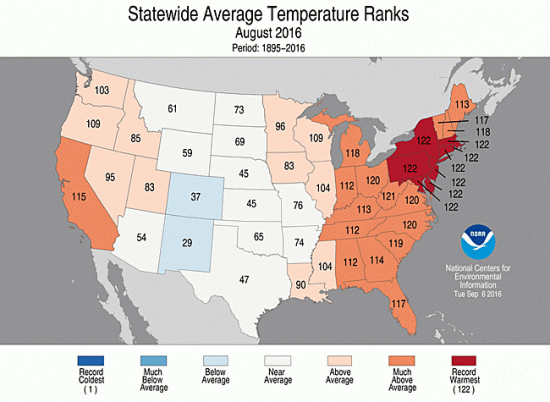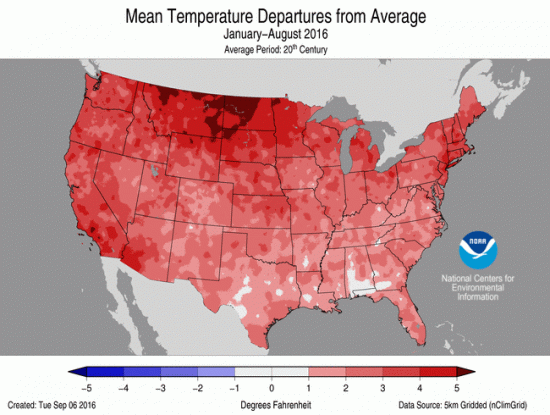News•September 8, 2016
5th Hottest U.S. Summer Saw Record Northeast Heat
The dog days of summer were especially scorching across the Northeast and Mid-Atlantic last month, with eight states in those regions recording their hottest August in 122 years. Two of those — Connecticut and Rhode Island — also had record-warm summers, according to data released Thursday by the National Oceanic and Atmospheric Administration.
While ample rains kept temperatures closer to normal across much of the country last month, the contiguous U.S. still had its fifth-warmest summer on record and its third warmest year-to-date.
Outside of the Lower 48, Alaska continued its streak of sweltering weather, with its third-hottest August and second-hottest summer in the past 92 years. So far, 2016 is far and away its hottest year on record.
How the average temperature of each state in the Lower 48 ranked for August.
Click image to enlarge. Credit: NOAA

The hot-even-for-summer temperatures come amid what has been the hottest year globally by a wide margin, with temperatures through July edging close to 1.5°C (2.7°F) above pre-industrial levels. That benchmark has been discussed by international negotiators as a potential tighter target for limiting global warming than the current 2°C (3.6°F) goal.
Thanks to a combination of weather and drought, much of the Northeast and Mid-Atlantic regions roasted during August. Connecticut, Delaware, Maryland, Massachusetts, New Jersey, New York, Pennsylvania, and Rhode Island were all record hot for the month.
The “Bermuda High” brought relatively warm and dry conditions to the area, NOAA climatologist Jake Crouch said in an email. Dry soils meant that less of the sun’s incoming rays went into evaporating moisture, “allowing daytime temperatures to soar,” he said. Meanwhile, moisture in the atmosphere kept heat indices high and led to warmer overnight temperatures.
Numerous cities in those areas also topped the charts, including Buffalo, Bridgeport, Conn., Philadelphia, Boston, and Wilmington, Del., according to the Northeast Regional Climate Center. Both LaGuardia and Kennedy airports also recorded a record-hot August, while Washington, D.C. had its second warmest.
RELATEDThe Future of National Parks is Going to be a Lot Hotter
July Makes 15 Record Hot Months in a Row
Only Connecticut, Rhode Island, and California had record-hot summers. A relatively cool June in the Northeast, and July heat that was largely confined to the coasts was the reason more Northeastern states didn’t see a top hot summer, Crouch said.
In California, the record summer heat has helped to fuel ferocious wildfires that have already charred tens of thousands of acres this year.
Overall, August ranked as the 17th warmest for the Lower 48 for August, thanks to temperatures that were closer to normal across a wide swath of the interior of the country. Those temperatures, in turn, were connected to rains in those areas that made the month the second-wettest August on record for the contiguous U.S.
“The precipitation in the Southwest, Rockies, and central U.S., suppressed temperatures, particularly daytime temperatures, and that lowered the overall contiguous U.S. average temperature,” Crouch said.
How temperatures across the contiguous U.S. have differed from normal for the year-to-date.
Click image to enlarge. Credit: NOAA

Elevated temperatures across more of the country earlier in the season helped the overall summer to tie 2006 as the fifth warmest on record for the Lower 48, measuring 2.1°F (1.2°C) above the 20th century average of 71.4°F.
With August averaged in, the year-to-date temperature for the contiguous U.S. is 2.8°F above the average of 53.9°F (12.2°C), taking the third-hottest spot.
In Alaska, the theme of record and near-record heat this year continued. It was the third-hottest August for the state and the second-warmest summer. Several spots — including Anchorage, Kenai, King Salmon, and Yakutat — had their hottest summer on record.
The unrelenting high temperatures are giving the Frontier State it hottest year by a staggering 7.6°F (4.2°C).
The odds favor above-average warmth across the entire Lower 48 as well as Alaska for the next three months, which increases the likelihood that Alaska will cement that record and that the U.S. overall could have a top 5 hot year.
You May Also Like:
Scientists Are Racing to Unravel an Ice Avalanche Mystery
Louisiana Floods Directly Linked to Climate Change
Here’s What China, U.S. Just Committed to on Climate
